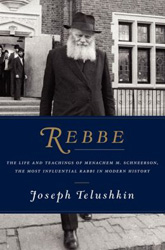William Liss-Levinson, member of the Board of the Jewish Book Council, sat down with fellow Board member and noted author, scholar and speaker Rabbi Joseph Telushkin, to discuss this newest book, Rebbe, focused on the life and teachings of the Lubavitcher Rebbe, Rabbi Menachem Mendel Schneerson.
 William Liss-Levinson: A number of books have been written in the past few years about the Lubavitcher Rebbe. And it’s twenty years since his death. What prompted you to write this book?
William Liss-Levinson: A number of books have been written in the past few years about the Lubavitcher Rebbe. And it’s twenty years since his death. What prompted you to write this book?
Joseph Telushkin: The Rebbe might well be the most well-known rabbi since Maimonides. I can think of no other rabbi who is as familiar to Jews in Israel, the U.S., the former Soviet Union, and France, the four most populous Jewish communities in the world today. So it certainly seemed that that this was a man whose life deserved to be studied in depth.
WL‑L: You’ve also chosen a unique approach, to discuss the Rebbe — according to thematic issues across time, with a fifty page chronological biography at the end. Why did you choose that approach to his life?
JT: I thought that what most mattered about the Rebbe were his viewpoints and his unique approach to a variety of issues. Also, I really was interested in writing a biography of his years of leadership. In 1951 he took over a small movement and turned it into the most dynamic religious movement in modern Jewish history — and that is what intrigued me; how he did it. A biography would need to focus in detail, for example, on things I was not as interested in: his years as a child in Russia and the years he spent in Germany and France in university. I was interested in that, and write about it in the book, but this was not what most interested me about the Rebbe
WL‑L: How did you gain access to the materials for your research?
JT: Thirty volumes of the Rebbe’s letters have been published — Chabad is not secretive; they really want the Rebbe’s teachings to get out to a more general readership. And while this was not an authorized biography and Chabad had no editorial control over any of the book’s contents, they did give generous access to the very people who could give an account of things the Rebbe did or said. I had to work very hard to research this biography, in part because the Rebbe was not the sort of person who spoke often about himself or his life experiences; he really said very little about himself.
WL‑L: What surprised you the most about his life, as you researched it?
JT: One of the surprising things about the Rebbe, given his strong opinions on various matters, was the degree to which his decisions, as his secretary Rabbi Yehuda Krinsky told me, were not “cookie-cutter;” he always tailored his advice to the individual in front of him. For example, because of the secular and often anti-religious orientation of many university faculty, he was generally opposed to a college education for his followers (at least at the age that most people go to university), but there were instances in which he approved it, and many instances in which he urged people to finish their degrees. It really depended on the circumstances and the person in front of him.
 WL‑L: What do you believe is the lasting legacy of the Rebbe?
WL‑L: What do you believe is the lasting legacy of the Rebbe?
JT: One way to assess a leader, perhaps the most important, is to look at what happens to his or her movement after the leader’s death. The remarkable feature of Chabad is that subsequent to the Rebbe’s death there has been a remarkable expansion in the movement — more than tripling in size. There are Chabad houses now in forty-eight of the fifty states and in eighty countries. This is a phenomenon, and one that was totally unexpected when he died, when many people thought that the movement would greatly contract. Also, some of his unique approaches which I think defined him as a leader and which I think continue to define the movement: his unconditional love for Jews, his use of optimistic language, his commitment to expressing disagreement without being disagreeable. And of course, the Rebbe’s most enduring achievement are the 4,000-plus couples, shluchim, who represent his vision throughout the world — and this accounts for Chabad’s enduring success.
William Liss-Levinson is vice president, chief strategy & operations officer of Castle Connolly Medical Ltd., a consumer health research, information, and publishing company. He holds a Ph.D. in education and is a member of the Board of Directors of the Jewish Book Council.
Related content:
- The Rebbe: The Life and Afterlife of Menahem Mendel Schneerson by Samuel Heilman and Menachem Friedman
- A House Divided by Matthew Shaer
- Joshua Braff Visits 770



